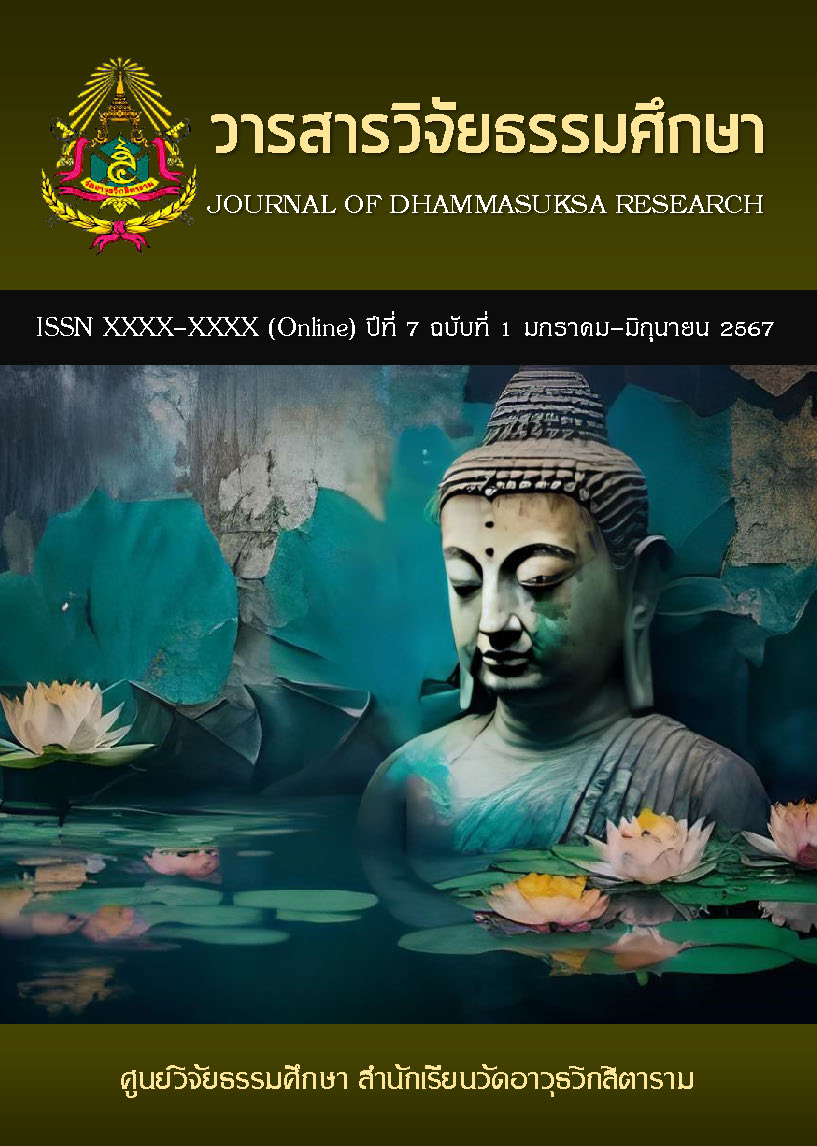ORGANIZATIONAL COMMITMENT AS A MEDIATION FACTOR ON THE RELATIONSHIP BETWEEN TRANSFORMATIONAL LEADERSHIP AND JOB SATISFACTION IN LUXUN ACADEMY OF FINE ART UNDER LIAONING PROVINCE
คำสำคัญ:
Mediating effects of organizational commitment, transformational leadership, job satisfaction, Luxun Academy of Fine Artบทคัดย่อ
The objectives of this research were: (1) to propose a model of mediating effects of organizational commitment on the relationship between administrators’ transformational leadership and faculty members’ job satisfaction within Luxun Academy of Fine Art in Liaoning province (2) to evaluate the model fit with the empirical data, and focus to the variables were influenced the job’s satisfaction of faculty members.
The total population of this study included 595 faculty members from Luxun Academy of Fine Art. A stratified random sampling method was used to sample, totaling 342 person which calculated from G*Power program. The instrument for collecting data was a questionnaire. Descriptive statistics and inferential statistics were used to perform data analysis by using statistical computer software.
Research results revealed that: (1) A mediating effects of organizational commitment relationship between administrator’s transformational leadership and faculty member’s job satisfaction model fit with the empirical data at statistically significant p< 0.01, the value of full model: Chi-square = 61.49, df = 51, p = 0.15, GFI = 0.97, AGFI = 0.96, CFI = 0.99, NFI = 0.98, and SRMR= 0.02. (2) Administrators’ transformational leadership, and faculty members organizational commitment had a directly influence faculty member’s job satisfaction (3) Administrator’s transformational leadership not indirectly influence faculty members job satisfaction through organizational commitment.
เอกสารอ้างอิง
Abualhamael, Z. W. (2017). The power of productive organizational energy in relation to leadership style and job satisfaction: The context of Saudi Arabian universities. [Doctoral dissertation, Manchester Metropolitan University]. Manchester Metropolitan University Library. https://espace. mmu.ac.uk/619873/1/My%20Final %20version%2810_10_2017% 29.pdf
AbuAlRub, R., & Alghamdi, M. (2012). The impact of leadership styles on nurses’ satisfaction and intention. Journal of Nursing Management, 20, 668-678. doi:10.1111/j.1365-2834. 01320.x
Alamir, I. (2010). Testing the impact of transformational and transactional leadership on job satisfaction and organizational commitment in private Syrian organizations. International Journal of Arts and Sciences, 3(12), 405-415. Retrieved from http://www.universitypublications.net/ijas/index.html
Alghamdi, H. (2017). Examining motivation-hygiene theory: Job satisfaction among faculty members in Saudi higher educational institution. (Publication No. 10287522) [Doctoral dissertation, Edgewood College]. ProQuest Dissertations & Theses Global.
Alonderiene, R., & Majauskaite, M. (2016). Leadership style and job satisfaction in higher education institutions. International Journal of Educational Management, 30 (1): 140-164.
Al-Tarawneh, K. A., Alhamadani, S. Y., & Mohammad, A. A. (2012). Transformational leadership and marketing effectiveness in commercial banks in Jordan. European Journal of Economics, Finance and Administrative Sciences, 2012(46): 71-87. Retrieved from www.europeanjournalofeconomicsfinanceandadministrativesciences.com
Amin, M. (2012). The relationship of principals/directors' leadership styles, as perceived by the faculty, to the job satisfaction of the faculty members in a public university of Punjab, Pakistan. (Publication No. U605702) [Doctoral dissertation, University of Leicester]. ProQuest Dissertations & Theses Global.
Antonakis, J., Avolio, B. J., & Sivasubramaniam, N. (2003). Context and leadership: An examination of the nine-factor full-range leadership theory using the multifactor leadership questionnaire. The Leadership Quarterly, 14, 261-295.
Atmojo, M. (2012). The influence of transformational leadership on job satisfaction, organizational commitment, and employee performance. International Journal of Business Studies, 5, 113-128. Retrieved from http://www.ijimt.org
Avolio, B. (2007). Promoting more integrative strategies for leadership theory building. American Psychologist, 62, 23-33.
Avolio, B. J. and Bass, B. M. (1991). The full range leadership development programs: basic and advanced manuals. Binghamton, New York: Bass, Avolio Associates.
Avolio, B. J. & Bass, B. M., (2004). Multifactor Leadership Questionnaire: Third edition manual and sampler set. Mind Garden.
Avolio, B. J., Walumbwa, F. O., & Weber, T. J. (2009). Leadership: Current theories, research, and future directions. Annual review of Psychology, 60(1), 421-449.
Avolio, B. J., Zhu, W., Koh, W., & Bhatia, P. (2004). Transformational leadership and organizational commitment: Mediating role of psychological empowerment and moderating role of structural distance. Journal of Organizational Behavior, 25, 951-968.doi:10.1002/job.283.
Barnett, A. M., Marsh, H. W., & Craven, R. G. (2003). What type of school leadership satisfied teachers? A mixed method approach to teachers’ perceptions of satisfaction. Self-Research Center, University of Western Sydney, Australia.
Bass, B. M. (1985). Leadership and performance beyond expectations. New York: The Free Press
Bass, B. M. (1990). Bass and Stogdill’s handbook of leadership: Theory, research, and applications. (3rd ed.). The Free Press.
Bass, B. M. (1998). Transformational leadership: Individual, military and educational impact. Mahwah, NJ: Erlbaum.
Bass, B. M. (1999). Two decades of research and development in transformational leadership. European Journal of Work and Organizational Psychology, 8(1): 9-32.
Bateh, J. & Heyliger, W. (2014). Academic administrator leadership styles and the impact on faculty job satisfaction. Journal of Leadership Education, 13(3): 34-49.
Belias, D., Koustelios, A., Sdrollias, L., & Koutiva, M. (2013). The influence of demographic features on the job satisfaction of Greek bank employees. International Journal of Human Resource Management and Research, 3(4): 15-28.
ไฟล์ประกอบ
เผยแพร่แล้ว
รูปแบบการอ้างอิง
ฉบับ
ประเภทบทความ
หมวดหมู่
สัญญาอนุญาต
ลิขสิทธิ์ (c) 2024 วารสารวิจัยธรรมศึกษา

อนุญาตภายใต้เงื่อนไข Creative Commons Attribution-NonCommercial-NoDerivatives 4.0 International License.



